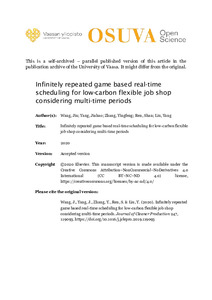Infinitely repeated game based real-time scheduling for low-carbon flexible job shop considering multi-time periods
Wang, Jin; Yang, Jiahao; Zhang, Yingfeng; Ren, Shan; Liu, Yang (2020-02-20)
Wang, Jin
Yang, Jiahao
Zhang, Yingfeng
Ren, Shan
Liu, Yang
Elsevier
20.02.2020
Julkaisun pysyvä osoite on
https://urn.fi/URN:NBN:fi-fe2022031724001
https://urn.fi/URN:NBN:fi-fe2022031724001
Kuvaus
vertaisarvioitu
©2020 Elsevier. This manuscript version is made available under the Creative Commons Attribution–NonCommercial–NoDerivatives 4.0 International (CC BY–NC–ND 4.0) license, https://creativecommons.org/licenses/by-nc-nd/4.0/
©2020 Elsevier. This manuscript version is made available under the Creative Commons Attribution–NonCommercial–NoDerivatives 4.0 International (CC BY–NC–ND 4.0) license, https://creativecommons.org/licenses/by-nc-nd/4.0/
Tiivistelmä
Production scheduling has great significance for optimizing tasks distribution, reducing energy consumption and mitigating environmental degradation. Currently, the research of production scheduling considering energy consumption mainly focuses on the traditional manufacturing workshop. With the wide application of the Internet of Things (IoT) technology, the real-time data of manufacturing resources and production processes can be retrieved easily. These manufacturing data can provide opportunities for manufacturing enterprises to reduce energy consumption and enhance production efficiency. To achieve these targets, a multi-period production planning based real-time scheduling (MPPRS) approach for the IoT-enabled low-carbon flexible job shop (LFJS) is presented in this study to carry out real-time scheduling based on the real-time manufacturing data. Then, the mathematical models of real-time scheduling are established to achieve production efficiency improvement and energy consumption reduction. To obtain a feasible solution, an infinitely repeated game optimization approach is used. Finally, a case study is implemented to analyse and discuss the effectiveness of the proposed method. The results show that in general, the proposed method can achieve better results than the existing dynamic scheduling methods.
Kokoelmat
- Artikkelit [2616]
